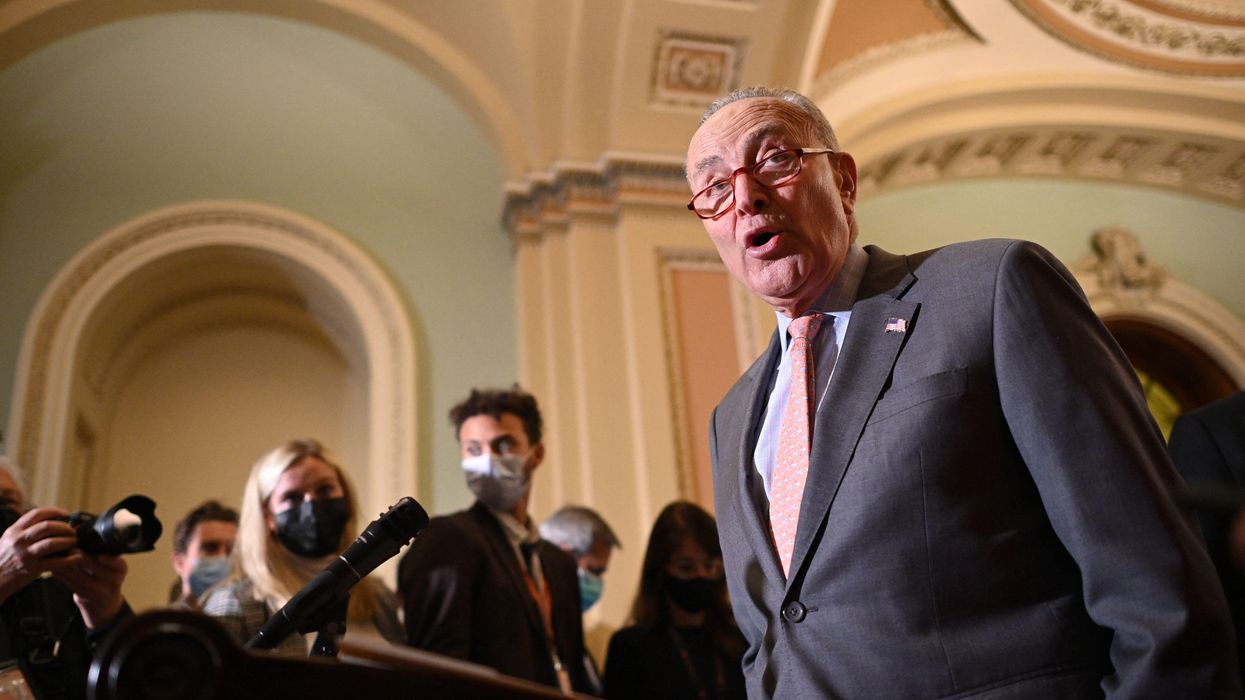With only a few weeks left until the end of the year, Democrats are facing a long legislative to-do list.
Senate Majority Leader Chuck Schumer outlined the party's priorities in a "Dear Colleague" letter sent to his caucus on Sunday. While celebrating the passage of the infrastructure bill, Schumer acknowledged the "considerable" work left to do this month and in December.
Among the top agenda items are the Democrats' two major electoral reform bills: the Freedom to Vote Act and the John Lewis Voting Rights Advancement Act. Both have been blocked from debate by GOP filibusters, but Schumer and his fellow Democrats appear determined to push forward.
The Freedom to Vote Act was introduced in the Senate in September as a compromise to the For the People Act. While the newer bill contains many of the same provisions as its predecessor, it was slimmed down to appease moderate Democrat Joe Manchin of West Virginia, who was the sole Democratic holdout on the For the People Act.
If enacted, the Freedom to Vote Act would ease access to the ballot box by expanding no-excuse absentee voting and automatic voter registration. It would also implement new minimum standards for states with voter ID laws. In addition to voting rights provisions, the bill would also strengthen protections for election workers, curb partisan gerrymandering and improve campaign finance transparency.
The Voting Rights Advancement Act, named after the late civil and voting rights icon John Lewis, would restore voting protections struck down by the Supreme Court. In 2013, the court's decision in Shelby County v. Holder eliminated the preclearance requirement, which mandated certain states with histories of racial discrimination receive advanced approval from the Justice Department before enacting new voting laws. The court's decision this summer in Brnovich v. Democratic National Committee made it harder to challenge potentially discriminatory laws in court.
Earlier this month, GOP Sen. Lisa Murkowski of Alaska and Manchin signed on to a revised version of the VRAA that modified which factors courts can take into account for cases of potential voting rights violations. These changes were proposed in an attempt to garner more GOP support for the bill.
However, except for Murkowski supporting the VRAA, Republicans remained staunchly opposed to both bills and voted to block them from debate in the Senate. The GOP's stonewalling has only fueled the call by voting rights advocates to reform or eliminate the filibuster.
And Schumer appears more willing than ever to consider such a move.
"Just because Republicans will not join us doesn't mean Democrats should stop fighting," Schumer wrote in the letter. "This is too important. Even if it means going at it alone, we will continue to fight for voting rights and work to find an alternative path forward to defend the most fundamental liberty we have as citizens."
Although the filibuster was not mentioned explicitly in the letter, Schumer did say that he and his colleagues have been discussing ideas for how to "restore the Senate to protect our democracy" and that these conversations will continue this week.
In addition to the electoral reform legislation, Schumer said the Senate will focus on clean energy investment through the Build Back Better Act. Also on the agenda is the National Defense Authorization Act, which approves Defense Department policies and funding. A measure that, among other things, would bolster domestic manufacturing and supply chains may be attached to the NDAA.
Another critical agenda item is approving the fiscal 2022 appropriations bill by Dec. 3 to avoid a government shutdown. Congress narrowly dodged this disaster earlier this fall by passing stopgap funding. Schumer noted in the letter that it is likely another continuing resolution will be necessary to delay the issue.
Lastly, the Senate will consider and vote on the dozens of individuals President Biden has nominated for various administrative roles and judgeships.
Schumer concluded his letter by saying, "I am confident we can get each of these important items done this year, but it will likely take some long nights and weekends."




















Trump & Hegseth gave Mark Kelly a huge 2028 gift